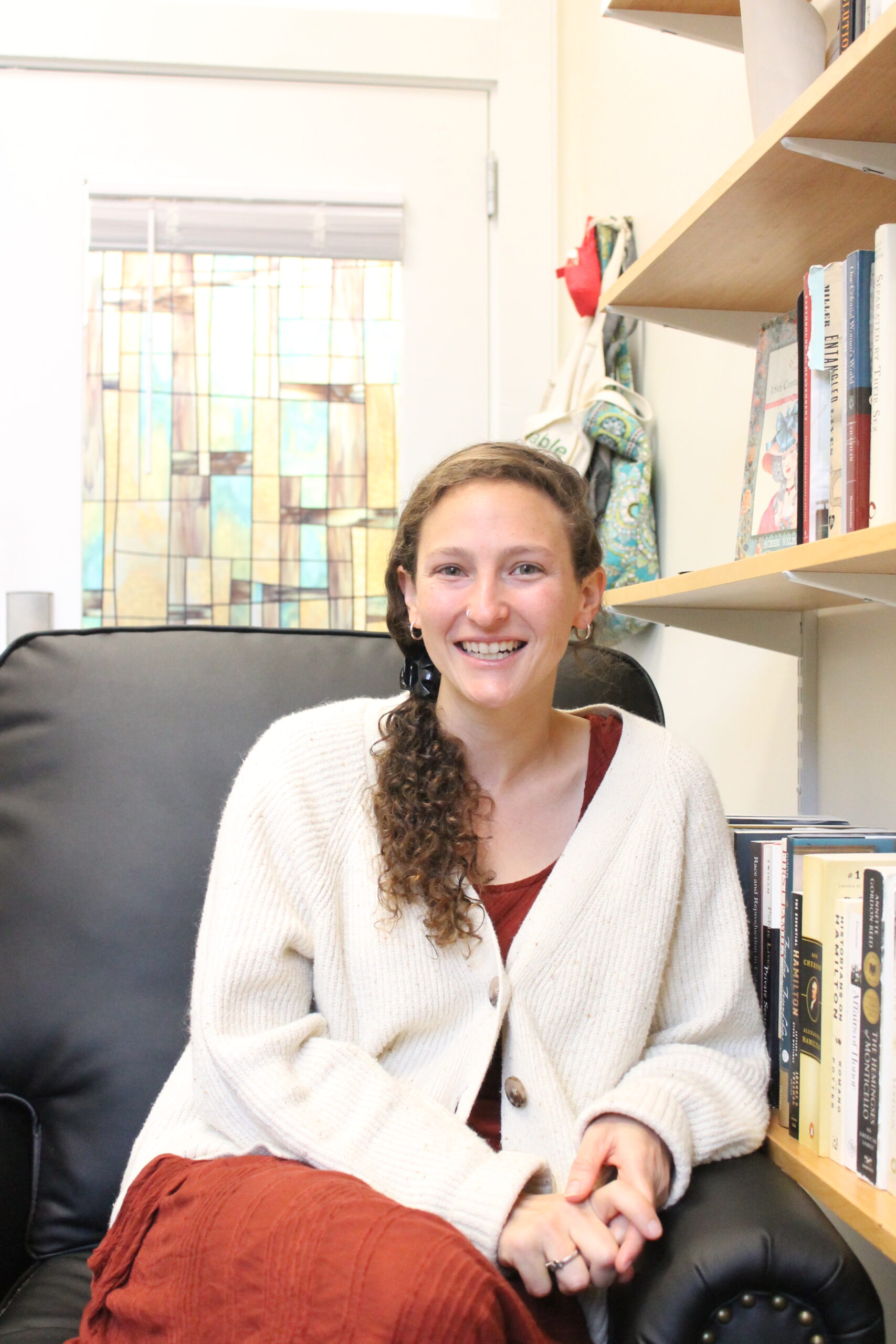Professor Caylin Carbonell explores New England history in first semester at Bowdoin
September 26, 2024
 Lillian Frank
Lillian FrankFor Assistant Professor of History Caylin Carbonell, history is powerful not just in the way it informs the present, but also in its ability to illustrate human agency. In her first semester at Bowdoin, Carbonell hopes to share this approach to studying history with students in her two classes, focusing on the early United States and New England.
“I think [learning history] is actually empowering because it suggests that we’ve created these things. We’ve changed these things. It shows you people’s agency, and by thinking historically, especially about the kind of history that I’m interested in, which is, ‘How did specific individuals act in really different ways?’ and, ‘How do we think about the variety of people that acted?’” Carbonell said. “When you bring that to bear on the present, it gives you a lot of hope.”
Carbonell sees Maine as the perfect setting to explore these histories. This semester, she is teaching “The Many Families of Early America,” a lecture class that studies the different ideas of family in the nation’s early days, including from European, African and Indigenous perspectives. Additionally, she is teaching a seminar entitled “A New England Reckoning: Slavery and Memory in the North. ”
“People are from all over the place in the course, but given that this is a class being taught at Bowdoin, in New England, it has a local history itself. It has even an institutional history at Bowdoin,” she said. “There’s a way of thinking about these issues: We’re thinking about the past, but we’re also going to think about the present and ways in which we can, as public historians, encounter that history.”
As part of these classes, Carbonell hopes to utilize and share with her students the local historical projects, museums and archives with which Maine abounds.
“I’m excited that there are so many different opportunities for me to explore,” Carbonell said. “We’re going to go on field trips to some historical homes nearby. We’re also going to go to the art museum…. There’s so much in the Bowdoin archives, and there’s so much even in the Maine Historical Society, the Pejepscot [History Center], and so it just feels like a place enmeshed in possibilities.”
Part of Carbonell’s teaching philosophy involves moving beyond just textbooks, which she acknowledges can be a barrier to some students’ interest in history. When she was in high school, she enjoyed history but often struggled to see the connection between what she was reading about in school and the history she saw come to life in the world around her.
“I liked the stories, but it never felt connected to anything. But the history I loved as a kid, and the throughline, is museums and historical sites. My mom used to bring me to a lot of different historic sites throughout New England. And I’ve always loved thinking about history in the public,” Carbonell said. “I don’t think I realized it was an interest until I had some really amazing, engaging professors in college who showed it to me in a different way.”
Carbonell became fascinated with research while at Bates College and started grappling with questions of power and how it connects to issues of family, gender, race and class. While her research focus has since narrowed, these broad theoretical interests continue to define how she approaches history.
As a graduate of Bates and a Ph.D. recipient from William & Mary, Carbonell has long appreciated the liberal arts college environment. She finds that smaller class sizes help foster the conversation and connection that is key to forming a deeper understanding of history. Additionally, she values the different perspectives that students across majors and subject interests bring to her classes.
“I majored in history, but I wasn’t only taking history. I think that, for me, that was very formative,” she said. “[There is] the opportunity not only to have students who are taking all of these other classes and bring all these other perspectives, which I think is huge, but also for me to use these resources and collaborate with people in other disciplines or bring in other modalities. I think that’s a really important part of the liberal arts, and I’m super excited about it here.”
Bowdoin students’ constant willingness to engage in dialogue, share their perspectives and learn from the perspectives of others is something that has stood out to Carbonell.
“I have just been completely awed at how engaged all of my students are. It’s really amazing.… I feel like I am in dialogue with, in some ways, at some moments, peers,” Carbonell said. “Especially in a seminar, where we’re all reading something, and the students are just reading so closely, and we’re all able to bring our own perspectives…. People from different disciplines notice different things, and for me, that’s actually really cool.”

Comments
Before submitting a comment, please review our comment policy. Some key points from the policy: